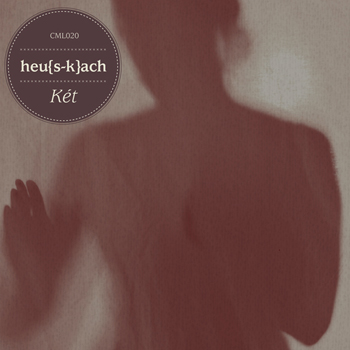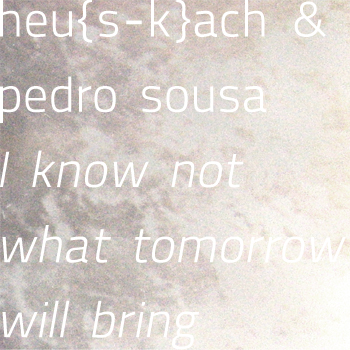home // bio // discog //
live // links

"Két" netrelease, 5 tracks, 50min, 2012
free mp3 & flac on Camomille netlabel.

"I know not what tomorrow will bring" w/ Pedro Sousa (sax & electronic), 150ex limited digisleeve cdr, 4 tracks, 42min, 2011
order on Insub's shop.
and the mp3 version is on Resting Bell netlabel.
the .zip here
Languor is their business, and business is good. They are d’incise and Marcel Chagrin, who collectively go by the typographically enhanced
name heu{s-k}ach, which is likely a pun whose meaning is lost on me. Their recent album on the restingbell.net netlabel bears a title that
speaks to its deeply improvisational orientation: I Know Not What Tomorrow Will Bring. The sense of anticipation is especially strong,
because the recording, four tracks in all, teams the duo with a third player, Pedro Sousa. The duo has an established sense of musical
camaraderie, but Sousa is a new element. A new element can be a chaotic thing, and in music as willfully staid as that by heu{s-k}ach,
the unexpected is all the more difficult to subsume. Chagrin plays guitar and drum, d'incise various electronics and sonified objects,
and Sousa a tenor saxophone. The result of their collaboration is exemplary drone-influenced European free improvisation -- which is to
say, it sounds like less than the sum of its parts. Especially recommended is its fourth and final track, "Bruno's Dream," which opens
with moments of intense delay between notes on Chagrin's guitar, and when d'incise and Sousa enter to fill the gap, they manage to slow
the proceedings even further. It's masterful.
On his dincise.net site, d'incise refers to it as "weird-blues-drone-improv," which seems like as good a description as any. The music,
as d'incise's summary suggests, has the feel of a score to a lost Jim Jarmusch film. Marc Weidenbaum.
A curious trio of D'incise (laptop, objects), Marcel Chagrin (guitar, amp, bass
drum) and Pedro Sousa (tenor sax, electronics) under the name Heu{s-k}ach &
Pedro Sousa. Recorded over day in April 2010 in Lisbon, they offer four pieces
of dense improvised music, carefully humming about, where each of the players
seems to have the intention of being close to each other. I am not sure if that
is really the intention or perhaps shyness on behalf of the players, but either
way: I think it sounds great. These pieces are intense affairs, full of
tension, like waiting for that storm that never comes (must be a 2011 summer
feel in The Netherlands), with a great collision of acoustic sounds and
electronics. Rumbling of objects, sustaining saxophones and the bass drum
holding matters together. The fourth piece, 'Bruno's Dream' leans towards jazz,
but in the context seems to work quite well. A fine work altogether. FdW/Vital Weekly 796
A colaboração do saxofonista tenor e electronicista Pedro Sousa com o duo suíço Heu(s-k)ach, formado por D’Incise (computador, percussão, objectos) e Marcel Chagrin (guitarra eléctrica, percussão) desenvolve-se em terrenos não muito distantes daqueles que são percorridos pelo projecto Pão, de que Sousa é um dos pilares. Há estruturas rítmicas repetitivas, “drones” e espaços de silêncio nesta música de efeitos oníricos que é apresentada como o “filho bastardo” da improvisação livre, da electroacústica e do psicadelismo. Com uma diferença de vulto: se o grupo português tem, sobretudo, um cunho ambiental, nesta parceria estão mais presentes as referências concretistas. Rui Eduardo Paes

"Un", 80ex limited cdr, screenprinted edition, 4 tracks, 47min, 2010
order on Insub's shop.
also availble as free download on Test Tube netlabel.
or directly here in a .zip
This release finds D’Incise, who co-leads the duo Diatribes with
percussionist Cyril Bondi (and numerous international guest artists), working
once again within a free-improvising duo format. His discrete, grainy approach is
soon recognisable from within that group – low, beating electronic sonorities laid
over a prickly bed of glitches and crackles, alongside acoustic rustlings,
squelchings and piercing bowed cymbal scrapes. The first track is striking
precisely because it doesn’t go for immediate, punch-to-the-gut impact; instead,
Chagrin plucks out the same chord over and over, emphasising the softer
sonorities of his instrument, though with a smattering of feedback. A gradual
rhythmic intersection between guitar and laptop, accentuated by bass drum,
lends the music the air of a slowly passing funeral march. ‘deux’ opens with
similar hanging, almost inert guitar sounds, D’Incise creating a mini-whirlpool of
squealing and scratching that trickles out to near-silence as the music reaches a
moment of quiet stasis, guitar and bass drum at once rhythmic and immobile, a
slowed-down heartbeat. Struck singing bowl and the music forces the listener to
hold themselves in suspense, to avoid movement, to quieten their breathing, even
to hold their breath, at once desiring to be lost within the sound and aware that,
at any moment, it could change; there’s a fragility here, underscored by the little
swirls of feedback, a sense that the electronics creating this calm could soon run
away into chattering activity. With great patience and fidelity to the mood, the
duo don’t let this happen: the music remains on the threshold of inattention, and
it’s possible that, at any one moment, it could seem either totally absorbing or
frustratingly reticent, depending on how much one is enamoured of the prevailing
sonorities (everything is still underlain by that near-static guitar). A little swell of
chiming percussion representing a temporary increase in volume soon fades to
the previous hush, with more soft chimes adding something of a temple
atmosphere; except that the ritual ceremonies are heard as if through the fuzz of
a semi-sleeping state. Still the bass drum provides a constant tread – progress
towards a goal, or marching on the spot? –still percussion rises and rings out,
now in a crescendo, the music imperceptibly becoming louder, with swirls and
croaks, but dipping back down once more, drum replaced by immobile guitar,
then by silence. ‘quatre’ is the first track not to have at its heart the guitar
sonorities laid out at the very beginning of the disc; instead, music-box, rubbed
contact-mic, single-note pluck – wispy, whispering, overlapping; guitar in a fuzzy,
swirling haze, once more promising some sort of climax through an increase in
volume; but then dying away, leaving that climax to slip away between the
cracks, lost in the music’s tendency to quietude. And yet there is a definite sense
here of something have been enacted, the beautiful hush of the final silence
providing evidence that all around has somehow been transformed by what came
before. It’s hard to say what exactly that was: as the description above indicates,
this improvisation (for, despite the track divisions, it is really one piece) doesn’t
work on narrative or linear terms, seeking instead to arrest them in a kind of
timelessness, even as its beating bass-drum and repeated guitar are a constant
reminder of pulse, of heartbeat, those closest and most unavoidable physical
signs of time passing. Often, music is described as ‘physical’, or to do with ‘the
body’, when it demonstrates a certain quality of ‘energy’, a certain kineticism or
(some would say) sexual vibrancy, which would seem to contrast sharply with the
disc under consideration. But that simple opposition won’t do: meditation, the
transcendence of the body, comes first through an intense concentration on
something bodily (breathing), and perhaps ‘un’ is like that initial stage, before the
transcendence of the body, but after a radical slowing-down and concentrated
focussing of consciousness. The result is a kind of physicality-through-stasis;
music that works on the logic of breathing, the logic of rising and falling
consciousness, of slowly awakening or slowly falling asleep; a protracted,
suspended lullaby, a thing of great patience and of great beauty.
David Grundy/Eartrip6
The album starts with sounds of crushing objects, cymbals and tones of an electric guitar. "Deux" is more quiet and the drony guitar sounds are supported by electronic sounds and bells or something like Tibitan singing bowls. The stringsounds roll closely with the ongoing sounds of these instruments. "Trois" builds up very slowly and the alternation of warm bellsounds and harsh electronics fits really well and moves into a restless noisy end. The last track "Quatre" ends also with a great diversity of sounds and atmospheres created by for example slide guitar, high bell tones. "Un" is the first CD of this new project of the free-minded d'incise. I like the calm atmosphere which he created with Marcel Chargin and the exploration of the most intense combination of soundwaves and rhythms.
JKH/vitalweekly
|
|

